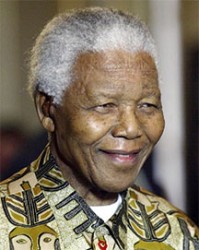JOHANNESBURG (Reuters) – Nearly 90 leaders from across the world, some of them locked in enmity, are flying to South Africa for memorials to Nelson Mandela that will hail one of humanity’s great peacemakers.

Officials said yesterday that US President Barack Obama and Raul Castro from Cuba, Zimbabwe’s Robert Mugabe and Britain’s David Cameron will be among those attending today’s main ceremony in Johannesburg’s Soccer City stadium – a turnout that reflects the global appeal of South Africa’s first black leader, who died on Thursday aged 95.
“The whole world is coming to South Africa,” foreign ministry spokesman Clayson Monyela said, playing down concerns about logistics and security of such a large event organized at such short notice.
Iranian President Hassan Rouhani would also be there, Monyela said, raising the possibility of a first face-to-face meeting with Obama. However, Rouhani’s name was not on an initial official list of attendees.
Israel, once an ally of the apartheid rulers who kept Mandela behind bars for 27 years, is sending neither its prime minister nor president, Israeli officials said.
Much of the logistical plan is based on South Africa’s hosting of the 2010 soccer World Cup. Even though Pretoria refused to discuss Mandela’s funeral arrangements before his death, it has been laying the preparations for years.
“We’re obviously not starting from scratch in terms of organization,” Monyela said. “We’ve got a system that kicks into play whenever you’ve got events of this magnitude.”
Besides security, the memorial at the 95,000-seat stadium near Soweto presents officials with a diplomatic minefield – trying to avoid a chance standoff in the rest rooms, say, between Mugabe and Tony Blair, the former British prime minister whom he has denounced as a “little boy” and a “liar”.
Those close to Madiba, the clan name by which Mandela was known, say he would have wanted handshakes, not head-butts.
“Tomorrow, people should all be honouring their relationship with Madiba. If it means shaking hands with the enemy, yes, I would like to see that,” Zelda la Grange, his former personal assistant for more than a decade, told Reuters.
“That is what Nelson Mandela was and actually is – bringing people together despite their differences.”
On the day, diplomacy is unlikely to detract from the outpouring of emotion expected at the seven-hour ceremony at the gigantic bowl-shaped Soccer City, a stadium steeped in Mandela history.
It was there that the Nobel peace prize winner made his last public appearance three years ago, waving to fans from the back of a golf cart at the World Cup final.
It was also there, 20 years earlier, that he addressed tens of thousands of supporters two days after his release from prison, eliciting a deafening roar from the crowd with a clenched fist raised to the sky and a single word: “Amandla”, the Zulu and Xhosa word for power.









